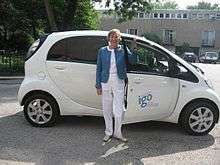I-GO
 | |
| Not-for-profit | |
| Industry | Car rental |
| Fate | Sold to Enterprise Holdings |
| Successor | Enterprise CarShare |
| Founded | 2002 in Chicago, Illinois |
| Founder | Center for Neighborhood Technology |
| Defunct | May 2013 |
| Headquarters | Chicago, Illinois, United States |
Area served | Chicago, Illinois |
| Services | Carsharing |
| Owner | Enterprise Holdings |
| Website |
www |
I-GO was a Chicago-based car sharing organization owned by Enterprise Holdings. I-GO was established in 2002 by the Center for Neighborhood Technology as an independent 501(c)(3) not-for-profit organization dedicated to creating and implementing new strategies that make urban communities more livable and environmentally sustainable. I-GO was sold to Enterprise Holdings in May 2013 and re-branded as Enterprise CarShare.
Mission
I-GO’s mission was to reduce car ownership rates, decrease transportation costs, reduce urban congestion and improve air quality in Chicago. From its inception, I-GO worked to catalyze a set of transportation innovations that make it feasible and desirable for Chicago residents to get around conveniently and economically without having to own a car and, at the same time, reduce vehicle miles traveled and greenhouse gas emissions. By contributing to the environmental improvement of the Chicago area and the decrease in expenses for residents, I-GO's triple bottom line impact provided a significant social return on investment.[1]
Operations
I-GO had cars located in approximately 30 Chicago neighborhoods. I-GO members reserved a vehicle online or by calling I-GO's customer service. Members could also create and modify their reservations using smart phones. Once a reservation had been created, the member could access the reserved car using a member card, use the car and then return it to the same location. Members paid a one-time fee to join, an annual renewal fee, and were then billed by the hour for their use of I-GO cars; specific rates varied depending on type of plan. Gas and insurance were both included in I-GO's rates. As of June 2009, I-GO had more than 12,000 members and 185 cars available for use.
The average fuel efficiency of I-GO's fleet was 35 miles per gallon, and the fleet was composed of low-emission vehicles. Approximately 40% of the fleet were hybrid vehicles and plug-in hybrid electric vehicles.
Plug-in hybrid electric vehicles

I-GO added the first two plug-in hybrid electric vehicles to its fleet in April 2009 as a result of a joint effort with electricity provider ComEd.
Partnerships
I-GO had strategic partnerships and alliances with government offices, local businesses, as well as other non-profits and independent car sharing organizations. Among others, I-GO worked closely with the Chicago Transit Authority, City of Chicago and Chicago Park District. Businesses such as Whole Foods and Dominick's provided parking spaces dedicated to I-GO cars, and I-GO also worked with universities, including Northwestern University, University of Chicago, Loyola University Chicago, DePaul University, University of Illinois at Chicago and Illinois Institute of Technology.
History
- 2001: I-GO is created by the Center for Neighborhood Technology as the first car sharing organization in the Chicago market
- 2002: I-GO begins operations as a pilot project with six cars
- April 2005: I-GO begins its suburban expansion, placing cars in Evanston, Illinois
- August 2008: I-GO and eight other leading non-profit and independent North American car sharing organizations adopt a code of ethics to specify standards and strengthen the industry
- October 2008: I-GO membership reaches 10,000
- January 2009: I-GO establishes a joint smart card with the Chicago Transit Authority, allowing I-GO members to access CTA buses and trains using a single card
- April 2009: Two plug-in hybrid electric vehicles are added to I-GO fleet; the joint effort between I-GO and ComEd is formally recognized by Governor Quinn
- May 2013: I-GO is sold to Enterprise Holdings[2]
See also
References
- ↑ "About us : I-GO Car Sharing". Igocars.org. Retrieved 2010-11-27.
- ↑ Wernau, Julie (2013-05-28). "Enterprise buying Chicago's I-Go car service". Chicago Tribune. Retrieved 2013-07-20.